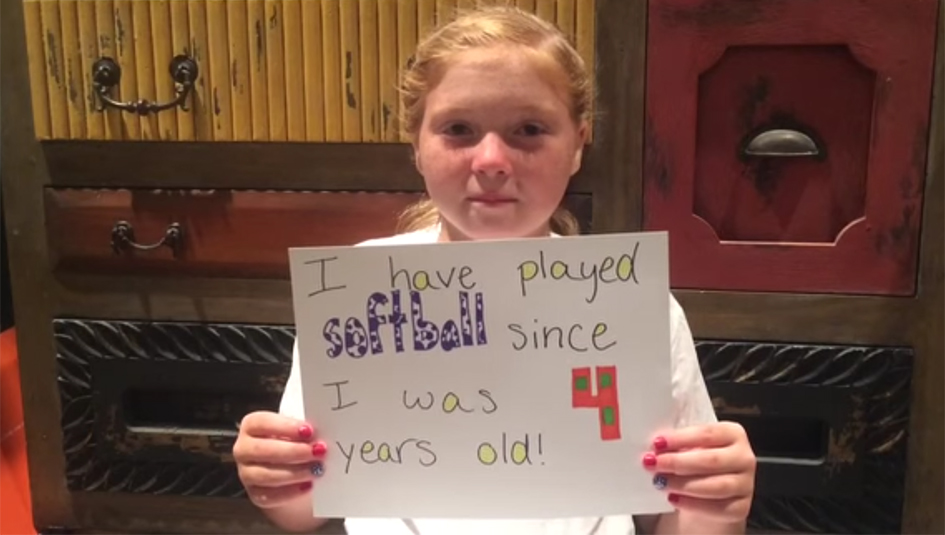Softball Player Kicked Off Team Because of Type 1 Diabetes

Ten-year-old Lundyn Cox of Mustang, Oklahoma learned by text message that she’d been kicked off her softball team because of her Type 1 diabetes. The text was sent to her mom, Brandy Skoropowski, by the coach. Lundyn was a “liability” to the team, the coach later told Skoropowski.
“It’s not a safe sport for her. On a 104⁰ day, she could slip into a diabetic coma,” a text said, according to Skoropowski.
On the day of Cox’s release from the Del City Eclipse, she had never missed a game in her career. She did have to sit out practice “once or twice,” she says – once because her insulin pump infusion line had dislodged during the night and she needed a day off to level out.
Her inquiry to the league office got no further response than “We’ll look into it and see what we can do.” Cox’s parents then consulted a lawyer, who advised that a remedy against what was then understood to be a privately organized sports league was a long shot.
The family ultimately decided not to force the issue – it was more important to them for Cox to get back in the game. She joined another team in town, the Lady Rangers of the Mustang Softball Association, although too late to be part of the regular season roster.
For the month and a half left of regular season play, Cox worked out with her new team, was a bat girl, and led cheers. She joined the team officially when the city-wide interleague tournament opened, and she got a chance to face her old team. In that game, she hit a bases-loaded line drive into center field, bringing in all three runners. Her team ended up winning 9-1, and her old team disappeared into the consolation bracket.
< After the game Ricky Torres, Cox’s new coach, told reporters, “‘It probably looked like they could’ve used her.” After her tournament-opener hitting display, she went home and made a YouTube video telling her story. The video caught the attention of KFOR, the Oklahoma City NBC affiliate. Her team went on to win the tournament.
For those keeping score, Cox throws and hits right and considers herself a utility infielder. She is determined to play softball for Notre Dame or Baylor. She also plays volleyball and basketball in her school league, but considers softball her main sport. She also is a JDRF ambassador and a leading pledge-getter for the regional JDRF Cure Walk. She is a straight-A student and hopes to become a research doctor, and she has participated in bionic pancreas trials.
We decided to dig a bit further to try to determine whether or not what happened to Cox was legal. It might come down to a question of whether the league she was first playing with was a public or a private organization. Public institutions are more likely to be held to federal laws that safeguard equal access to all.
We tried to reach league officials for an explanation of its action in dismissing a player for having Type 1. At first, it appeared that the league was operating under the auspices of Optimists International, a venerable U.S-Canadian organization of regional service clubs which has sponsored youth sports activities since the 1920’s. The enrollment form that Cox’s parents had signed, and the league ballpark information, seemed clear on that.
However, the parent organization says it no longer is connected to the league. Margaret Davis, an Optimists International district governor, expressed her surprise that the league still branded itself with the organization’s name. She said the organization’s club serving the Del City area had folded its fall league in 2011 or 2012. She and Benny Ellerbe, Optimists International executive director, suggest that if the program it once sponsored is still in operation, it must have been turned over to a municipal agency or a civic group, as is customary with sports programs founded by organization chapters.
“As in many communities, [the] former Optimist Club’s legacy is the sports parks and playing fields for youth which are donated over to local government or other local groups after the club is disbanded,” Mr. Ellerbe responded by email. “If there is a group of parents that wish to bring back the local Optimist Club, for proper oversight and corrective actions to ensure all children are protected, we would quickly move to re-establish a Club in Del City.”
Mr. Ellerbe also says he “strongly condemns” what happened to Cox, adding, “I sincerely regret this coach’s poor judgement.”
If a municipality or other government body offers an activity, such as a youth sports program, that gives rise to enforcement action and private remedies under the federal Americans with Disabilities Act. We inquired of the city and the operator of the Del City Ballpark as to who sponsored Cox’s old team, but the inquiries went unanswered.
We will continue to track developing news about this case, and Cox’s softball career, and keep you informed of developments.
Thanks for reading this Insulin Nation article. Want more Type 1 news? Subscribe here.
Have Type 2 diabetes or know someone who does? Try Type 2 Nation, our sister publication.







